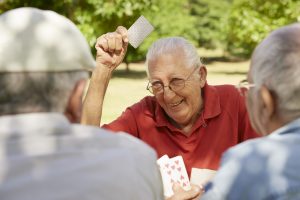Maintaining a healthy aging mind is one of the greatest challenges that health authorities are facing with the constant increase in the numbers of aged adults. According to researchers who are trying to figure out how to keep the aging mind healthy, the easiest and most effective way is for adults to take a new mental challenge such as quilting, cross-stitching, painting, or even digital photography. These types of activities maintain cognitive vitality. The results of the study are available in Restorative Neurology and Neuroscience.
Advertisement
While this previous evidence suggests that engaging in enriching lifestyle activities and other enjoyable activities may be associated with maintaining cognitive vitality, there was no science behind the understanding. It was always a cause-effect relationship. The mechanism as to why these activities improve cognitive enhancement has always been poorly understood.
To understand this mechanism better, senior author Denise Park and lead author Ian McDonough, from the University of Texas at Dallas, did a detailed study in 39 older adults. As part of the study, the researchers first analyzed changes in brain activity that resulted from taking up high-challenge activities that required learning and constant mental effort. The next step was to compare these changes with the changes brought about by low-challenge activities that did not require active learning.
The changes were recorded using an array of cognitive tests and brain scans (fMRI -, a technology that logs brain activity by identifying changes associated with blood flow).
All participants were tested before and after the 14-week period and some of them were retested, again after a year.
The researchers found that high-challenge group showed better memory performance after the high-challenge intervention, and an increased ability to modulate brain activity more efficiently. Prior to the intervention, the older adults were processing every item, both easy and hard, with maximum brain activity. But after participation, they were able to modulate their brain activity to the demands of the task. This is a clear indication that there was a more efficient use of cognitive resources.
The low-challenge group did not exhibit these changes in cognitive modulation.
From these findings, it is indicative that mentally demanding activities may protect the nerve cells and the nervous system, and may be an important element for maintaining a healthy brain into late adulthood.
Advertisement
According to senior author Denise C. Park, PhD, of the Center for Vital Longevity, School of Behavioral and Brain Sciences, University of Texas at Dallas, their findings are among the first experimental evidence that mentally-challenging leisure activities can actually change brain function and that it is possible that such interventions can restore levels of brain activity to a more youth-like state. However, the team is aware that more concentrated studies, involving larger participant groups should be done to understand whether their findings are universal.
Having said that, the team is cautiously optimistic that age-related cognitive decline can be slowed or even partially restored if individuals start taking up more mentally challenging and stimulating activities.
Sources:
http://www.eurekalert.org/pub_releases/2016-01/ip-mca011516.php

